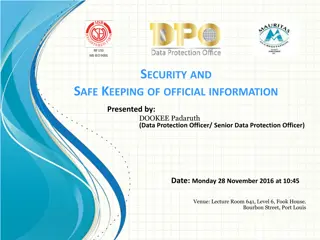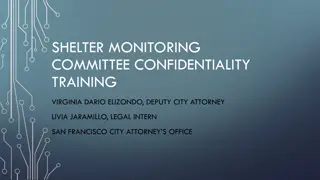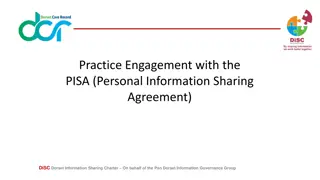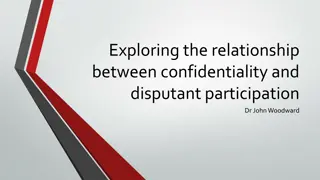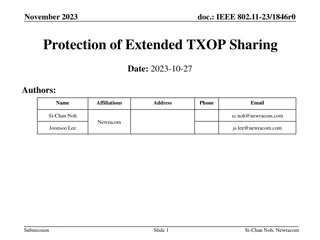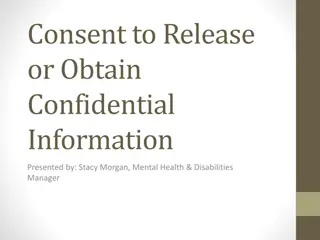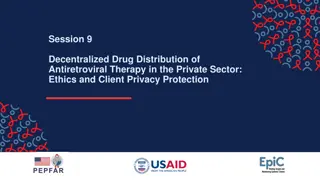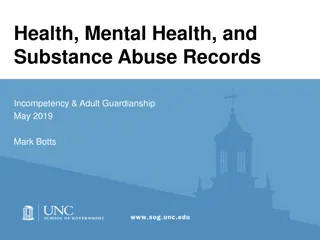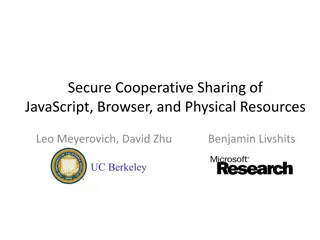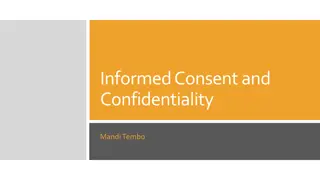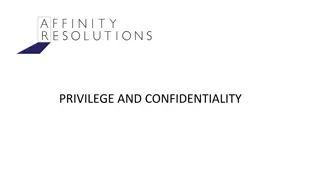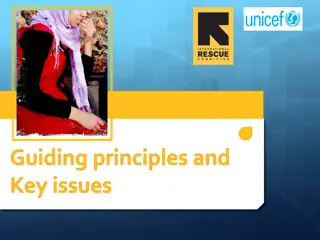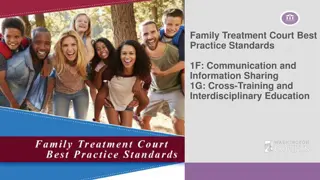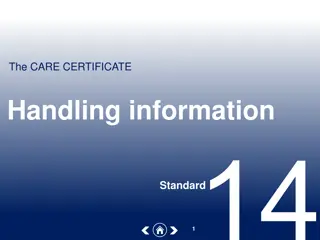Understanding Confidentiality in Information Sharing
Delve into the nuances of sharing confidential information responsibly. This guide explores the laws and considerations surrounding confidentiality, emphasizing the importance of analyzing and managing confidential data before sharing. Learn about the types of information protected by various laws and who holds the duty of confidentiality.
Download Presentation

Please find below an Image/Link to download the presentation.
The content on the website is provided AS IS for your information and personal use only. It may not be sold, licensed, or shared on other websites without obtaining consent from the author. Download presentation by click this link. If you encounter any issues during the download, it is possible that the publisher has removed the file from their server.
E N D
Presentation Transcript
Can confidential information be shared? A guide to analyzing the question Mark Botts & Jill Moore
Why are we talking about this? People or agencies may want to share information: To facilitate post-overdose response efforts To link people with SUD with community services that support their treatment or help their families To share information with the community about the impact of SUD on health or families Before sharing, it s important to know if the information is confidential, and if so how to manage it.
Setting Expectations This session will not answer all your confidentiality questions! This session will identify the basic information that is needed to analyze a confidentiality question.
Basic Information Sharing QuestionsA Step-by- Step Analytical Approach Does the law let us do this? Is the information sharing you want to conduct subject to one or more confidentiality laws? If so, does the law let you share the information in the manner and for the reasons you want to?
Is the information sharing activity governed by one or more confidentiality laws? What information do you want to share? Who has the duty to follow the law or laws that apply to the information? What is the duty of confidentiality?
What information? What is the nature of the information and is it confidential under one or more laws? Speaking generally, Health care information is confidential under the HIPAA Privacy Rule Mental health care information is confidential under a state law (122C) Substance use disorder treatment information is confidential under federal law (42 CFR 2) EMS information is protected by a state law (143-518) Student information is protected by FERPA Communicable disease information is protected by a state law (130A-143)
Who has a duty of confidentiality? Who has a duty to follow the laws that apply to confidential information? HIPAA governs health care providers and other covered entities G.S. 122C applies to mental health care providers and those who receive information from these providers 42 CFR 2 applies to substance abuse treatment providers and those who receive information from these providers G.S. 143-518 applies to EMS providers The Family Educational Rights and Privacy Act applies to public schools GS 130-143 applies to anyone who has information that identifies someone as having a reportable communicable disease Note: If you are asking for information from an agency or professional covered by one or more of these laws, they should be able tell you that!
What and WhoThe Need to be Specific We will need to get specific about the nature of the information and who has it or initially obtained it. Example: Child s uncle living in the home is addicted to pain killers. Is that information confidential under 42 CFR 2, the federal law governing SUD treatment services? 42 CFR 2 restricts the disclosure of information that: Would identify a patient of SUD services as someone who has a SUD, and Was obtained by a SUD program for the purpose of diagnosing or treating SUD.
ExampleIs the information confidential? Record of child s mental health treatment in possession of MH treatment agency says in the social/family history section that the mother, at intake of the child, reported that an uncle living in the home is addicted to pain pills. Is this substance use information protected by 42 CFR 2? No, 42 CFR 2 governs information received by a substance abuse program for the purpose of treating SUD, diagnosing SUD, or referring for SUD treatment. The information was not obtained by a substance abuse program for these purposes. Is this information protected by GS 122C? Yes.
ExamplesWho has a duty of confidentiality? Health care provider discloses protected health care information about a patient to the child protective services unit of the department of social services. Does the health care provider have a duty to follow HIPAA when disclosing the information? Does DSS have a duty to follow HIPAA before redisclosing the information? Substance abuse program discloses SUD information about a SUD patient to the child protective services unit of DSS. Does the SA program have a duty to follow 42 CFR 2 when disclosing the information? Does DSS have a duty to follow 42 CFR 2 before redisclosing the information?
What is the Duty of Confidentiality? General rule of nondisclosure: If you or your agency is governed by one or more confidentiality laws then you may not disclose information that is confidential under that law or laws Except as authorized or required by that law Every confidentiality law has exceptions that allow information to be disclosed in particular circumstances described in: The confidentiality law itself, or The patient s written authorization (consent for release).
Basic Information Sharing Questions Assume the information sharing you want to conduct is governed by one or more laws because, The information is confidential under those laws Some of the parties to the information sharing are bound by those laws They have a duty NOT to share UNLESS they can find a provision an exception to confidentiality in those laws that permits the sharing OMG! It s confidential?!!! What now? How do we determine if there are one or more exceptions that allow the information sharing?
Basic Information: The Three Ws WHAT specific information will be shared? WHAT WHO will the information be shared with? WHO WHY will the information be shared what is the purpose of sharing it? WHY
Example: May a health care provider disclose confidential patient information to law enforcement? WHY (purpose of disclosure) HIPAA answer & citation* To report a gunshot wound as required by NC law Yes (45 CFR 164.512(f)(1); G.S. 90-21.20) To provide information to a LE officer who inquires about a missing person or runaway Yes, but only a limited amount information may be provided (45 CFR 164.512(f)(2)) To report a person for using illicit drugs No To provide information about an inmate that the health care provider has treated Maybe (45 CFR 164.512(k)(5)) To report the theft of drugs or a prescription pad from the health care provider s office Yes (45 CFR 164.512(f)(5)) To avert a serious and imminent threat to a person or the public Yes (45 CFR 164.512(j)) *If laws other than HIPAA apply, the answers may be different
Summary: Information-Sharing Analytical Framework Is the proposed information-sharing subject to one or more confidentiality laws? What information do you want to share? Who has the duty to follow the law or laws that apply to the information? What is the duty of confidentiality? If yes, whether and how information can be shared depends in part on: WHAT information is to be shared, WHO the information will be shared with, and WHY the information will be shared.


